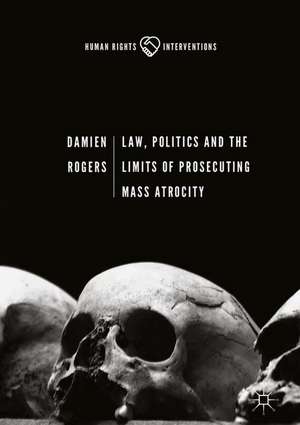Law, Politics and the Limits of Prosecuting Mass Atrocity: Human Rights Interventions
Autor Damien Rogersen Limba Engleză Hardback – 11 sep 2017
| Toate formatele și edițiile | Preț | Express |
|---|---|---|
| Paperback (1) | 578.15 lei 38-44 zile | |
| Springer International Publishing – 11 aug 2018 | 578.15 lei 38-44 zile | |
| Hardback (1) | 641.85 lei 6-8 săpt. | |
| Springer International Publishing – 11 sep 2017 | 641.85 lei 6-8 săpt. |
Din seria Human Rights Interventions
- 15%
 Preț: 650.69 lei
Preț: 650.69 lei - 15%
 Preț: 499.43 lei
Preț: 499.43 lei - 18%
 Preț: 730.16 lei
Preț: 730.16 lei -
 Preț: 453.21 lei
Preț: 453.21 lei - 18%
 Preț: 785.24 lei
Preț: 785.24 lei - 15%
 Preț: 475.80 lei
Preț: 475.80 lei -
 Preț: 385.47 lei
Preț: 385.47 lei - 15%
 Preț: 585.26 lei
Preț: 585.26 lei - 15%
 Preț: 589.14 lei
Preț: 589.14 lei - 15%
 Preț: 637.93 lei
Preț: 637.93 lei - 18%
 Preț: 777.69 lei
Preț: 777.69 lei - 18%
 Preț: 718.02 lei
Preț: 718.02 lei -
 Preț: 316.71 lei
Preț: 316.71 lei -
 Preț: 385.62 lei
Preț: 385.62 lei -
 Preț: 315.95 lei
Preț: 315.95 lei -
 Preț: 353.18 lei
Preț: 353.18 lei
Preț: 641.85 lei
Preț vechi: 755.13 lei
-15% Nou
Puncte Express: 963
Preț estimativ în valută:
122.82€ • 128.56$ • 102.22£
122.82€ • 128.56$ • 102.22£
Carte tipărită la comandă
Livrare economică 31 martie-14 aprilie
Preluare comenzi: 021 569.72.76
Specificații
ISBN-13: 9783319609935
ISBN-10: 3319609939
Pagini: 244
Ilustrații: X, 244 p.
Dimensiuni: 148 x 210 mm
Greutate: 0.46 kg
Ediția:1st ed. 2018
Editura: Springer International Publishing
Colecția Palgrave Macmillan
Seria Human Rights Interventions
Locul publicării:Cham, Switzerland
ISBN-10: 3319609939
Pagini: 244
Ilustrații: X, 244 p.
Dimensiuni: 148 x 210 mm
Greutate: 0.46 kg
Ediția:1st ed. 2018
Editura: Springer International Publishing
Colecția Palgrave Macmillan
Seria Human Rights Interventions
Locul publicării:Cham, Switzerland
Cuprins
1. Introduction .- 2. International Military Tribunals .- 3. Indictment of German and Japanese War Leaders .- 4. Opening Statements at Nuremberg and Tokyo .- 5. Ad-hoc International Criminal Tribunals .- 6. Indictment of Yugoslav and Rwandan Troublemakers .- 7. Opening Statements at The Hague and Arusha .- 8. International Criminal Court .- 9. New Generation of Prosecutors: Warrants, Summonses and Opening Statements .- 10. Conclusion.
Recenzii
“Examining prosecutors’ work through the lens of critical thinking can be regarded as a novel and ambitious choice of methodology, and can certainly be of interest to discourse analysis scholars and specialists on international relations and conflict studies.” (Galina Nelaeva and Elena Khabarova, Leiden Journal of International Law, Vol. 32 (2), June 2019)
Notă biografică
Damien Rogers is Senior Lecturer at the Centre for Defence and Security Studies at Massey University, New Zealand.
Textul de pe ultima copertă
Damien Rogers is Senior Lecturer at the Centre for Defence and Security Studies at Massey University, New Zealand.
This book offers a unique and powerful critique of the quest for international criminal justice. It explores the efforts of three successive generations of international prosecutors, recognising the vital roles they play in the enforcement of international criminal law. By critically examining prosecutorial performance during the pre-trial and trial phases, the volume argues that these prosecutors are simultaneously political actors serving in the interests of economic liberalisation. It also posits that international prosecutors help wage a mostly silent and largely unacknowledged politico-cultural war fought for control over the institutions governing modernist international affairs. As the author contends, international prosecutors are thus best understood as agents not only of the law and politics, but also of a war fought by proponentsof various utopian projects.
Caracteristici
Offers an entirely new way of comprehending the conduct of those whose job it is to prosecute the most serious of international crimes Argues that law is a form of politics, and that both ICL enforcement and the politics of economic liberalisation are a means of waging politico-cultural war Highlights the complicity between the production of scholarly knowledge in academia and the support for the international prosecutor’s work
